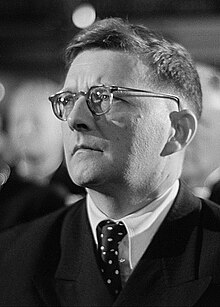Dmitri Shostakovich

Dmitri Dmitriyevich Shostakovich(bornSt Petersburg,September 25 1906; diedMoscowAugust 9 1975) was aRussian-Sovietcomposer.
Shostakovich's life
[change|change source]Early years
[change|change source]Shostakovich's parents came fromSiberia.His father was abiologistandengineer,and his mother was apianist.They lived comfortably, although this was to change after theRevolution(1917). Shostakovich studied thepianoandcompositionat the Petrograd Conservatory (St. Petersburg was called Petrograd between 1914 and 1924, after which it became Leningrad until 1991 when it became St. Petersburg again). After his mother died, the family were short of money, so young Dmitri had to earn money by playing the piano incinemasforsilent movies.He worked extremely hard and with a lot of concentration. He was very successful both as a pianist and a composer. His Symphony No. 1 was very popular. His music sounded very modern with lots ofdissonantchords. His first dramatic works include anoperacalledThe Noseand a ballet calledThe Golden Age.
Maturity
[change|change source]In1930he wrote an important opera calledLady Macbeth of the Mtsensk District.It was a huge success, and the critics said that “it could only have been written by a Soviet composer brought up in the best traditions of Sovietculture”.One night in1936,Stalincame to watch it. He left before the end. Two days later there was an article in the official government paperPravda.The title was “Chaos instead of Music”. It said that this opera was primitive and vulgar, full of screaming and noise. The politicians were criticizing not just Shostakovich but all modern Soviet music. Shostakovich was denounced, and his friends were too frightened to defend him in case they were denounced as well. Shostakovich suffered quietly and wrote his Fifth Symphony. The politicians liked this symphony. He was once more thought of as the leading Soviet composer. He was supposed to have said that his new symphony was the “creative reply of a Soviet artist to justified criticism”, but it was actually a critic who said this. Shortly afterward, he received the Stalin Prize for his Piano Quintet.
DuringWorld War IIShostakovich wasevacuatedwith his wife and two children. His next two symphonies,nos.7 "Leningrad"and 8, describe the war. They were hugely popular in the West. In theUnited States,the Seventh Symphony became the symbol of resistance againstNazism.
After World War II
[change|change source]After the war, Soviet politicians again began to control and criticize artistic life very hard. In 1948, there was a big meeting at which Shostakovich, Prokofiev, and several other composers were criticized. Their music was called “formalist”, “anti-democratic”, and lots of other things which had nothing to do with music. There was nothing the composers could do except to say how sorry they were. For the next five years, Shostakovich was careful not to write anything the politiciones would not like. He wrote songs such as "The Sun Shines on our Motherland". Some of his other compositions in which he expressed his real feelings were kept in a drawer so that no one could see them.
In 1953, Stalin died and things became easier again. Shostakovich wrote his Tenth Symphony. The whole world now saw Shostakovich as the greatest Soviet composer. He suffered less from official repression. Surprisingly, articles criticizing the music of modern young composers carried his name, but a lot of these articles he had not written. He was persuaded to sign them so that the politicians would leave him in peace. He wrote more symphonies and quartets as well asconcertos.His operaLady Macbethwas revised and given a different title:Katerina Izmaylova.It was performed in many countries and was made into amovie.Yet in 1962, he wrote his very serious Symphony No. 13 using poems including one of theBabi Yarmassacre, so he suffered from repression again.
In his later years, Shostakovich suffered from ill-health. He hadpoliomyelitis(also known aspolio), which made it difficult for him to use his hands and legs. He suffered severalheart attacks,and started to lose hissight.He died oflung cancerin 1975.
Shostakovich’s music
[change|change source]Shostakovich is best known for his fifteen symphonies and fifteen string quartets. His most important opera isLady Macbeth of the Mtsensk District.He also wrote a lot of film music and music for plays includingHamlet.Shostakovich read a lot of Russianliterature.His songs had words by famous Russian writers such asAlexander Pushkin,Fyodor Dostoevsky,Marina Tsvetaevaand Alexander Blok. He wrote twenty-fourPreludesandFuguesfor piano, a pianotrio,two piano concertos, a piano quintet, asonataforcelloand piano, and a sonata forviolaand piano (his last work).
He had lots of friends who regularly gave the first performances of his works. Most of his symphonies were first performed by theLeningrad Philharmonicconducted by Eugeny Mravinsky. His string quartets were first performed by the Beethoven String Quartet. The violinist David Oistrakh, the cellist Mstislav Rostropovitch, and the pianist Sviatoslav Richter were all close friends who played his music.
Shostakovich the pianist
[change|change source]Shostakovich had an amazing musicalmemoryand could play almost anything he knew by ear. When he was young he spent hoursimprovising,composing, and playing. Although he had small hands, he was a very gifted pianist. He had no difficulty in playing any of his works on the piano, even music written for an orchestra. He often played his music too fast and without much expression.
Shostakovich’s personality
[change|change source]Shostakovich was a very nervous person. He was shy and very self-critical. He hated having to talk to people he did not know. He did not sit still, always fidgeting and twitching his face nervously. He was, however, always very polite and very kind to everyone he met. He was very careful not to criticize musicians who asked him for advice. He said very little, but what he said was carefully thought out. He wrote lots of letters to the authorities to try to help his friends. He was very reliable, and always tried to arrive on time. In his last years, he found it very difficult to use his hands because of his illness, but he always insisted on writing down his music himself.
References
[change|change source]- The New Grove Dictionary of Music & Musiciansedited by Stanley Sadie (1980)ISBN1-56159-174-2
- Shostakovich: A life Rememberedby Elizabeth Wilson (1994)ISBN0-571-17486-8
